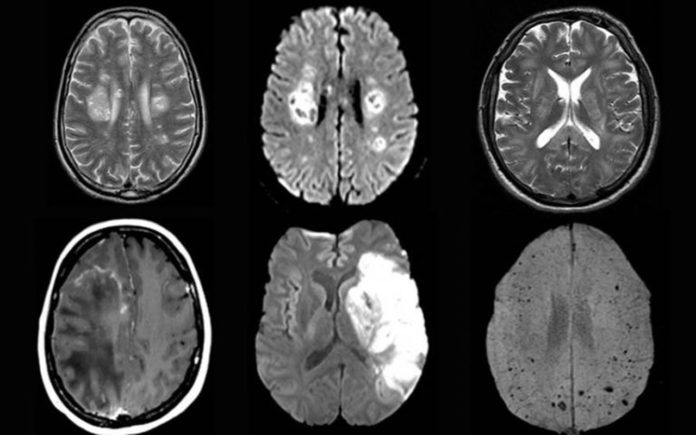Preliminary clinical data indicate that COVID-19 infection is associated with neurological and neuropsychiatric illness. Now a new study by the UCL and UCLH suggests an increase in delirium, rare brain inflammation, and stroke linked to COVID-19.
For the study, scientists identified one rare and sometimes fatal inflammatory condition, known as ADEM, which appears to be increasing in prevalence due to the pandemic.
Some patients in the study did not experience severe respiratory symptoms, and the neurological disorder was the first and foremost presentation of COVID-19.
Joint senior author Dr. Michael Zandi (UCL Queen Square Institute of Neurology and University College London Hospitals NHS Foundation Trust) said: “We identified a higher than expected number of people with neurological conditions such as brain inflammation, which did not always correlate with the severity of respiratory symptoms.”
“We should be vigilant and look out for these complications in people who have had COVID-19. Whether we will see an epidemic on a large scale of brain damage linked to the pandemic – perhaps similar to the encephalitis lethargica outbreak in the 1920s and 1930s after the 1918 influenza pandemic – remains to be seen.”
The study offers a detailed account of neurological symptoms of 43 people (aged 16-85) treated at the National Hospital for Neurology and Neurosurgery, UCLH, who had either confirmed or suspected COVID-19.
Scientists distinguished ten instances of transient encephalopathies with delirium, which relates to different examinations discovering proof of delirium with agitation. There were additionally 12 instances of brain inflammation, eight cases of strokes, and eight others with nerve damage, for the most part, Guillain-Barré syndrome.
Most (nine out of 12 cases) of those with brain inflammation conditions were diagnosed with acute disseminated encephalomyelitis (ADEM).
However, the virus causing SARS-COV-2 was not identified in the cerebrospinal brain fluid of any of the patients tested. It means the virus does not directly attack the brain to cause neurological illness. Further research is needed to identify why patients were developing these complications.
Scientists suggested that brain inflammation was the result of an immune response to the disease. Meanwhile, some neurological complications of COVID-19 might come from the immune response rather than the virus itself.
The findings add clinical descriptions and detail to another recent study, which also involved Dr. Zandi and co-author Dr. Hadi Manji identifying 153 people with neurological complications from COVID-19. This paper also confirms the previously reported findings of a higher than expected number of patients with a stroke, which results from the excessive stickiness of the blood in COVID-19 patients.
Joint first author Dr. Ross Paterson (UCL Queen Square Institute of Neurology) said: “Given that the disease has only been around for a matter of months, we might not yet know what long-term damage COVID-19 can cause.”
“Doctors need to be aware of possible neurological effects, as early diagnosis can improve patient outcomes. People recovering from the virus should seek professional health advice if they experience neurological symptoms.”
Joint first author Dr. Rachel Brown (UCL Queen Square Institute of Neurology and UCL Infection & Immunity) said: “Our study advances understanding of the different ways in which COVID-19 can affect the brain, which will be paramount in the collective effort to support and manage patients in their treatment and recovery.”
Joint senior author Dr. Hadi Manji said: “Our study amalgamates, for the first time, the clinical presentations of patients with COVID-19 neurological disease with MRI and laboratory features including, in one case, a brain biopsy.”
“This now sets up a template for other researchers around the world, facilitating coordinated research to optimize the diagnosis and treatments of these complications, which, to date, has proved difficult. Also, patients are going to require long term follow up.”
Journal Reference:
- Ross W Paterson et al. The emerging spectrum of COVID-19 neurology: clinical, radiological and laboratory findings. Brain, A Journal of Neurology. DOI: 10.1093/brain/awaa240
